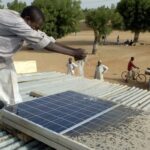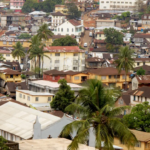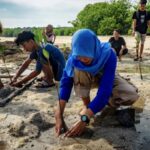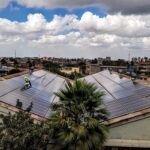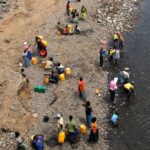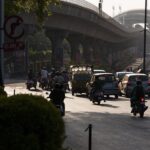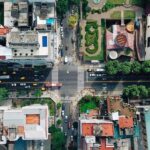Posts tagged with 'food security'
New research from WRI’s Electric School Bus Initiative and Carleton University shows that the U.S. would see an estimated $1.6 billion in health and climate benefits every year by using electric school buses. This estimate accounts for the cost to society of using diesel-burning school buses ...

Nearly a decade ago, the world rallied around the Paris Agreement on climate change and the goal of holding global temperature rise to 1.5 degrees C (2.7 degrees F). Since then, the “1.5C goal” has become the world’s North Star ...

In the heart of Nairobi’s Mathare slums, a quiet but powerful revolution is growing – one plant at a time. Teenage mothers, often marginalized and overlooked, are transforming their lives and their community through urban farming and organizing. Their efforts ...

For the 21 million residents of Lagos, Nigeria, climate change is not a distant concept — it is a current reality. Over the past decade, the city has experienced devastating floods, exacerbated by the loss of over half of its wetlands ...

For more than 20 years, WRI has identified annual “stories to watch.” These are the year’s moments, issues and decisions that we believe will shape the future trajectory of the world. In the past, we’ve highlighted things like dangerous heat in cities, ...

Every three years, ICLEI hosts the ICLEI World Congress to showcase how subnational actors advance sustainable urban development worldwide. The most recent installment, ICLEI World Congress 2024, held June 18-21 in São Paulo, Brazil, converged over 1,500 global attendees to ...

By early 2025, countries are due to unveil new national climate commitments under the Paris Agreement, known as nationally determined contributions (NDCs). These commitments form the foundation of international climate action, establishing emissions-reduction targets and other measures that countries promise ...

In the Seychelles archipelago in east Africa, flooding and erosion caused by rising sea levels pose an imminent threat to the country’s many low-lying islands. At the same time its mangrove forests, which serve as a vital buffer against these ...

India experienced almost one extreme weather event per day in the first nine months of 2022. And the state of Rajasthan is no stranger to this phenomenon, with its capital city, Jaipur, ranking 22nd on the Global Climate Vulnerability Index. ...

“Climate change is affecting cities all around the world, and Freetown is no exception.” That’s what Eugenia Kargbo, Freetown’s Chief Heat Officer, told UrbanShift during the City Academy hosted in Kigali last year. Through her role—the first of its kind in ...

This year is a critical moment for climate action. The mounting impacts of climate change, from floods and droughts to hurricanes and heat waves, are taking a major toll on human lives and economies globally — particularly in vulnerable developing nations ...

Climate change is already having a significant impact on Africa’s ecosystems, economy and society. This year alone, 1.8 million Africans were displaced during a prolonged drought, the Democratic Republic of Congo experienced catastrophic flooding, and Cyclone Freddy left a trail of destruction in Malawi and Mozambique. ...

New data from WRI’s Aqueduct Water Risk Atlas show that 25 countries — housing one-quarter of the global population — face extremely high water stress each year, regularly using up almost their entire available water supply. And at least 50% of the ...

Join us July 17-18 for Connect Karo 2023 at the India Habitat Centre, New Delhi. Register now and review the agenda. Since 2013, WRI India’s annual flagship event, Connect Karo, has served as a platform for facilitating dialogue between policymakers, experts ...

Cities occupy just 3 percent of the Earth’s land, but account for most of the global energy consumption and carbon emissions. Many cities are also more vulnerable to climate change and natural disasters due to their population densities and interconnected infrastructure. ...


















